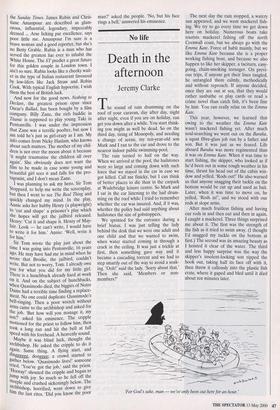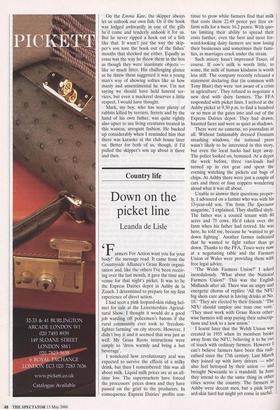No life
Death in the afternoon
Jeremy Clarke The sound of rain drumming on the roof of your caravan, day after day, night after night, even if you are on holiday, can get you down after a while. You start think- ing you might as well be dead. So on the third day, tiring of Monopoly, and needing a change of scene, my ten-year-old son Mark and I ran to the car and drove to the nearest indoor public swimming-pool.
The rain turned to hail on the way. When we arrived at the pool, the hailstones were so large and coming down with such force that we stayed in the car in case we got killed. Call me finicky, but I can think of better places to die than in the carpark at Wadebridge leisure centre. So Mark and I sat in the car listening to the hail drum- ming on the roof while I tried to remember whether the car was insured. And, if it was, whether the policy had said anything about hailstones the size of gobstoppers.
We sprinted for the entrance during a brief hiatus. I was just telling the lady behind the desk that we were one adult and one child and that we wanted to swim, when water started coming in through a crack in the ceiling. It was just a trickle at first, then something gave way and it became a cascading torrent and we had to step smartly out of the way to avoid a soak- ing. 'Ooh!' said the lady. 'Sony about that.' Then she said, `Members or non- members?' The next day the rain stopped, a watery sun appeared, and we went mackerel fish- ing. We try to go every time we get down here on holiday. Numerous boats take tourists mackerel fishing off the north Cornwall coast, but we always go with the Emma Kate. Force of habit mainly, but we like Emma Kate because she is a proper working fishing boat, and because we also happen to like her skipper, a taciturn, easy- going, chain-smoking teenager. On previ- ous trips, if anyone got their lines tangled, he untangled them calmly, methodically and without reproach. If anyone decided, once they are out at sea, that they would rather sunbathe or play cards or read a crime novel than catch fish, it's been fine by him. You can really relax on the Emma Kate.
This year, however, we learned that owing to the weather the Emma Kate wasn't mackerel fishing yet. After much soul-searching we went out on the Baraka, a squat fibre-glass job run by a father and son. But it was just as we feared. Life aboard Baraka was more regimented than it was on Emma Kate. When it was time to start fishing, the skipper, who looked as if he'd been out in some rough weather in his time, thrust his head out of the cabin win- dow and yelled, 'Rods out!' He also warned us that anyone snagging their tackle on the bottom would be cut up and used as bait. Later, when it was time to move on, he yelled, `Rods in!', and we stood with our rods at slope arms.
After much fruitless fishing and having our rods in and then out and then in again, I caught a mackerel. Three things surprised me about it. The first was the strength of the fish as it tried to swim away. (I thought I'd snagged my tackle on the bottom at first.) The second was its amazing beauty as I hoisted it clear of the water. The third and less happy surprise was the way the skipper's insolent-looking son ripped the hook out, taking half its face off with it, then threw it callously into the plastic fish crate, where it gaped and bled until it died about ten minutes later.
`For God's sake, man — we've only been out here for an hour.' On the Emma Kate, the skipper always let us unhook our own fish. Or if the hook was lodged awkwardly in one of the gills he'd come and tenderly unhook it for us. But he never ripped a hook out of a fish like that. It wasn't just the way the skip- per's son tore the hook out of the fishes' mouths that shocked me either. Equally as crass was the way he threw them in the box as though they were inanimate objects like so much litter. His challenging glance as he threw them suggested it was a young man's way of showing softies like us how manly and unsentimental he was. I'm not saying we should have held funeral ser- vices, but even a mackerel deserves a little respect, I would have thought.
Mark, my boy, who has seen plenty of rabbits killed by terriers, ferrets and by the hand of his own father, was quite rightly also upset to see living creatures treated in this wanton, arrogant fashion. He bucked up considerably when I reminded him that there was karaoke at the club house later on. Better for both of us, though, if I'd pulled the skipper's son up about it there and then.



























































 Previous page
Previous page